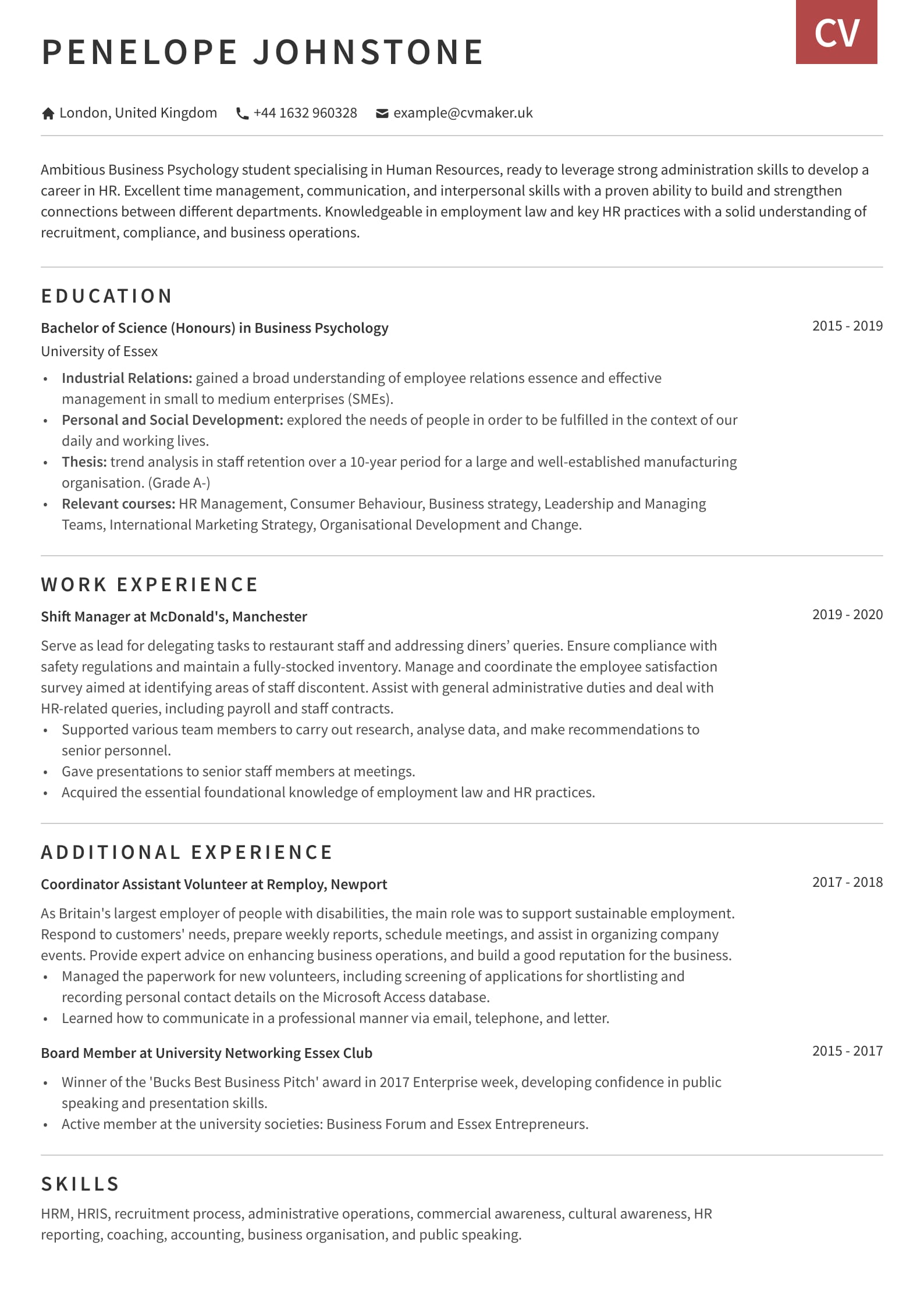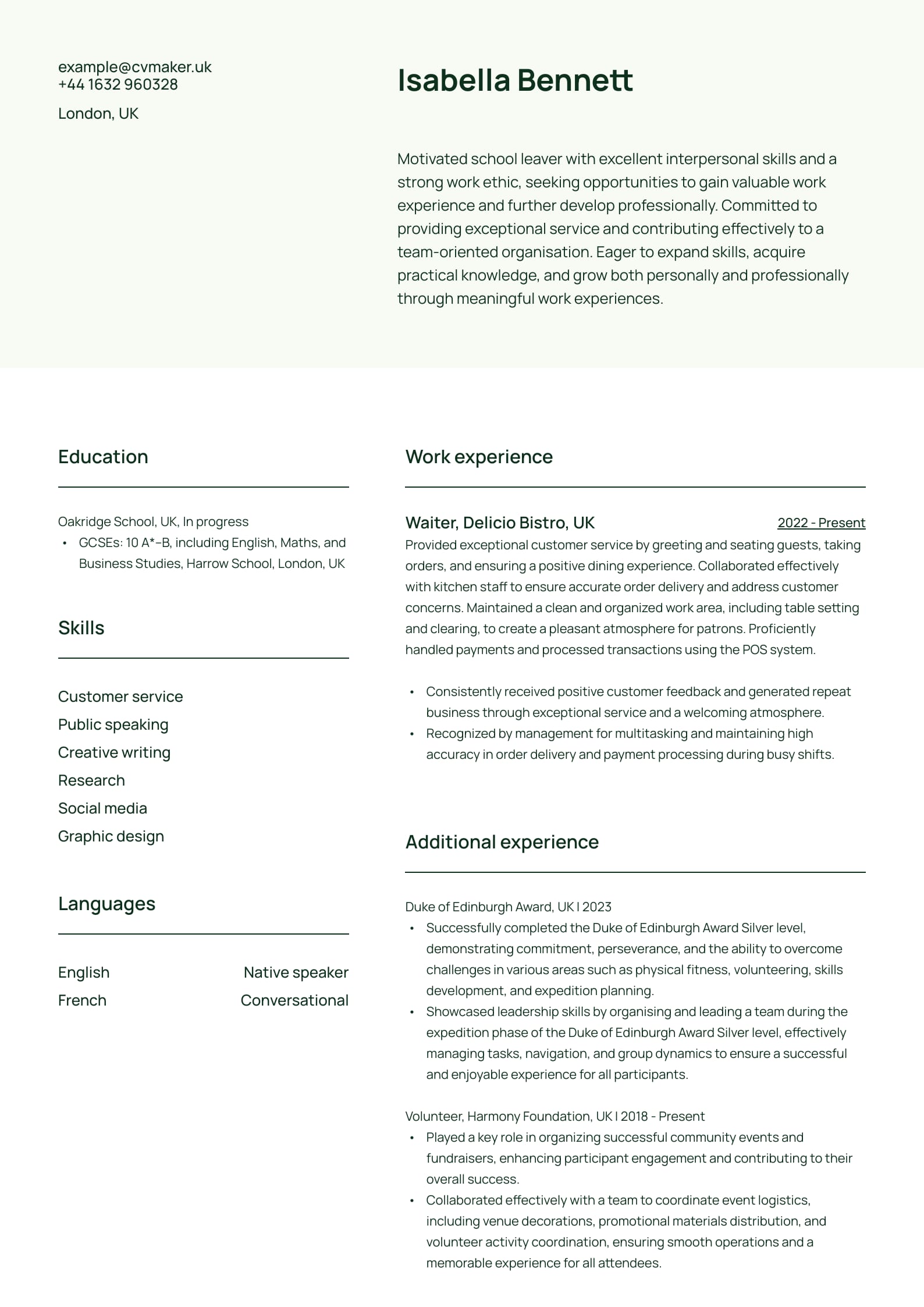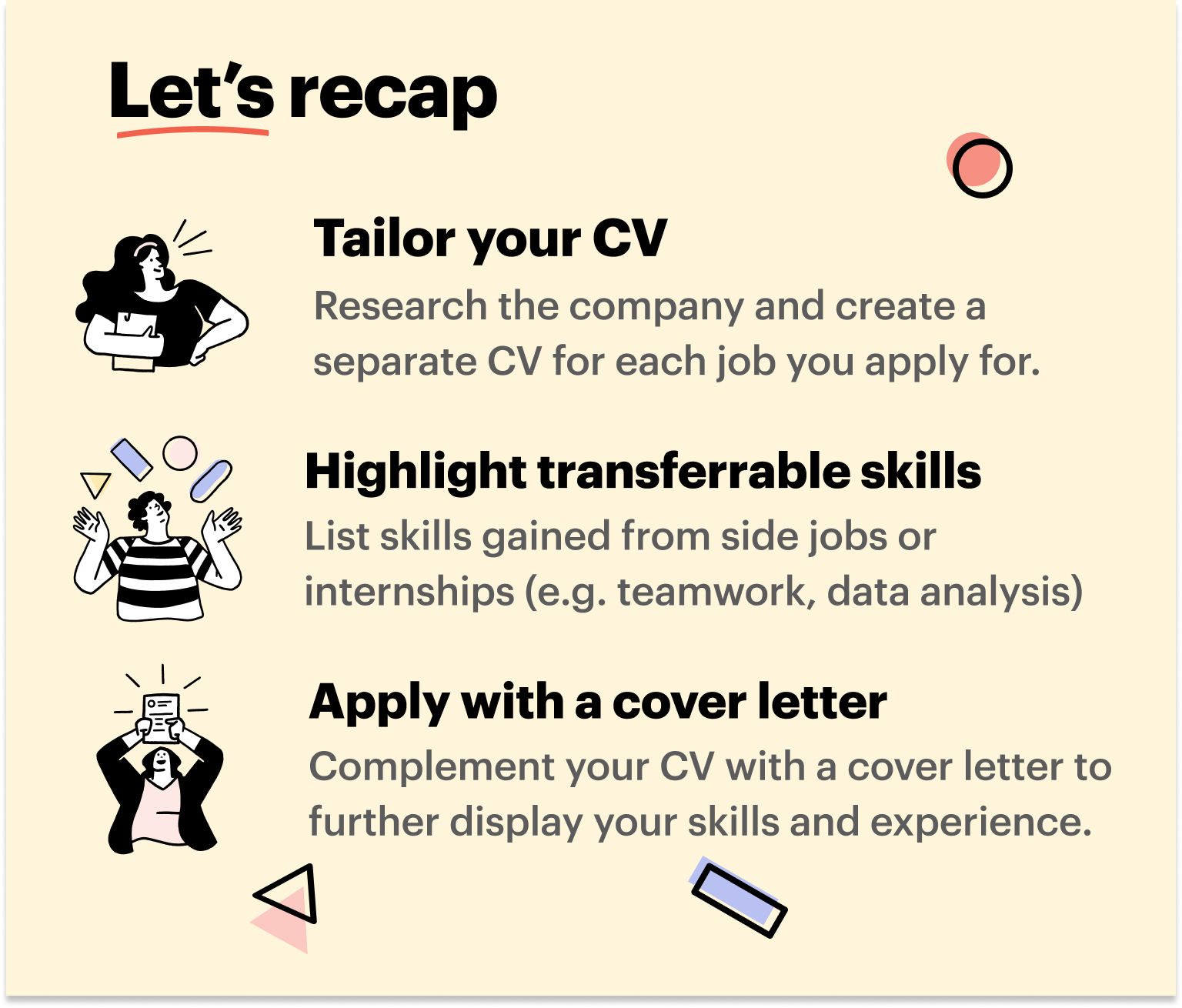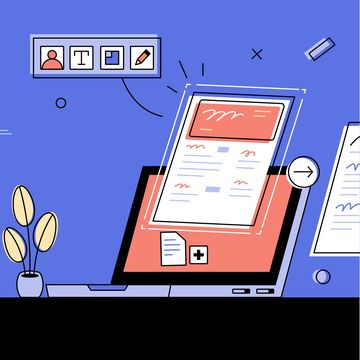Whether you’re a student, school leaver, or recent graduate looking for your first job, you need a modern CV to be successful. Even if your experience seems limited, there are several strategies to highlight your transferable skills, qualifications, and other experiences.
Stuck with your CV? We've got good CV examples for a first job to help get you started!
Here’s what we cover in this article to help you write the perfect CV for your first job:
Key sections and information: guidance on how to write a CV for first job and the essential components to include.
CV examples and CV templates: choose the best CV format for the first job you are applying for.
Common mistakes to avoid on a CV with checklist: how to write your first CV and pay attention to the details.
Writing a CV with no experience: what to include to emphasise your unique skills.
Good first CV examples: select a starter CV sample to customise.

Let CVMaker guide you through the CV writing process, offering a professional first CV template to highlight your strengths.
How to make a CV for a first job
Like any good CV, it's crucial to incorporate the must-have sections that effectively showcase your strengths, top skills employers looking for, and achievements.
Personal contact information: Include your full name, phone number, professional email, location, and LinkedIn profile.
Personal profile, also known as personal statement: Mention your background, soft skills, and career goals.
Skills: Using bullet points, list hard and technical skills in a separate 'Skills' section.
Work experience: Elaborate on your part-time jobs, internships, and volunteer work, focusing on achievements and key learnings with the use of action verbs.
Education: State your highest level of education, mentioning your relevant courses and projects.
Must-have CV sections
Personal profile
Skills section
Work experience
Education
Learn more about how to write a good CV.
If applicable, you could incorporate the following CV sections to fill in the gaps or strengthen your application:
Awards
Professional training
Conferences
Publications
For more information on GPDR laws and UK requirements, refer to our related blog article on whether to include a photo on a CV.
How to write a CV for the first time
It can really help to have a clear understanding of what kind of job or industry you're looking for, but don't worry if you're still figuring it out. We recommend to focus on tailoring your CV and cover letter to specific job openings, keeping an eye out for keywords and the main skills required. Take a look at the company's website to note key goals, ongoing projects, and mission and vision statements that you can incorporate into your job application.
Font: Opt for a clean and professional font like Arial and Calibri, keeping the font size between 10 and 12 and slightly larger (e.g. 14-16) for title and headings.
Colour: Use neutral colour combinations with consistent use throughout, avoiding heavy graphics
Margins and alignment: Stick to 1' or 1.5' margins on all sides, keeping your text left-aligned with short spaces between each section to ensure readability.
Headings: Use short names for sections to break up your CV and avoid cluttering different information in one place.
Bullet points: We recommend using bullet points over long text descriptions to detail your key achievements, making scanning your CV and finding necessary information easier.
For more tips, check out our related blog articles on the best colour and font for a CV.

What counts as work experience on a CV?
This section can take many forms, and it's essential to highlight your expertise and value to potential employers. Here are a few examples of what counts as work experience on a CV:
Internships: Provide valuable hands-on experience in a professional setting, applying academic knowledge and gaining industry insights.
Part-Time Jobs: Include any paid or unpaid work relevant to the job you're applying for, highlighting applicable skills and responsibilities. This can also include seasonal work.
Volunteer Work: It show relevant skills and experiences, showcasing dedication, teamwork, and community involvement.
Apprenticeships: Combine work and study to gain industry-specific skills and qualifications, offering hands-on experience.
Traineeships: Offer structured training programs combining practical work experience with learning and gaining industry-specific skills.
Freelance Work: Explain your freelance projects, who you worked for, and the skills you developed.
Work Placements: Provide hands-on experience in a professional environment, highlighting skills and knowledge gained.
Job shadowing: Mention shadowing professionals in your desired industry to show proactive learning and industry insight.
Remote work offers a fantastic opportunity for those embarking on their first job, providing flexibility and accessibility like never before. Check out the following CV examples if you are looking for remote work opportunities:
Feeling stuck with where to start? Artificial intelligence (AI) can help with your CV, but knowing how to use it effectively is key. We break it down in our AI CV writing guide.
3 good CV templates for first job
1. Student CV example

Download this student CV template for first job for free in PDF.
This student CV sample features Penelope, a third-year university student looking to kickstart her career in Human Resources. She opted for a one-column format and a simple CV template. By including education at the top of the CV, she draws the recruiter's attention to key skills and qualifications. Part-time or voluntary experience has been strategically incorporated into the additional experience section with years only. Penelope create a matching student cover letter to further enhance her job application.
Still not sure what job to apply for? Check out our list of best student jobs to help narrow down your search.
2. School leaver CV example

Download this school leaver CV example for free in PDF
In this CV sample for a first job, Isabella highlights achievements. She has showcased her customer service and language skills to gain a competitive edge. The Wheaton CV template is well-structured, concise, and well-formatted, which looks appealing and is easy to read for recruiters.
Uncertain about job opportunities? Browse through our list of in-demand jobs that didn't exist 20 years ago.
3. Internship CV example

Katie Andrews is a recent graduate looking to kickstart a career through an internship. With the Princeton CV template, she showcases her experience through education and side jobs while drawing attention to her technical and language skills.
Read more tips on how to enter the workforce after graduating.
How do I write a CV for my first job with no experience?
Starting your first job search can be exciting but also a bit daunting, especially when you feel like you don't have much experience to showcase. Interestingly, some of the highest paying jobs don't require a degree. Regardless of your level of experience, there are many ways to create a compelling CV that highlight your potential and enthusiasm. Here are some tips to help you get started:
Choose the appropriate CV format based on your background.
Opt for a professional CV template with easy-to-read sections.
Add a personal statement explaining your background, main achievements, and career goals.
Highlight the transferable skills gained from side jobs or volunteer work.
Mention relevant projects, internships, or apprenticeships.
State your highest level of education.
For more insights, check out our related blog article on how to write a CV with no experience.
Explore the following good CV examples for first jobs with no experience to help you in your job search:
Are you considering a job in healthcare? Explore these healthcare jobs that require little to no experience.
10 common mistakes to avoid on a CV for your first job
When creating your first CV you need to pay careful attention to details and every statement on your CV to ensure you present yourself well. Here are the common mistakes to steer clear of:
Spelling and grammatical mistakes.
Irrelevant information that doesn't match job's criteria.
Poor formatting and layout.
Clichés and generic statements.
Outdated information.
Lack of keywords from the job opening.
Unprofessional email address or personal details.
Combining duties and achievements.
CV is too long.
Exaggerating or lying.
For more tips, see our blog article on how to improve your CV.

Use this checklist for your next job application to elevate your CV!
Still looking for more inspiration? Check out the following CV and cover letter samples to help you get started:
Sales CV and cover letter.
Key takeaways
Even with no experience, you can create an applicant tracking system (ATS)-friendly CV for a first job by using the right approach. Here are a few final tips to bear in mind when entering the workforce in the UK:
Customise your CV for each job to match the job requirements and keywords indicated in the job description
Use a simple CV and professional format with bullet points, neutral headings, and consistent style.
Use bullet points and action verbs to highlight key information and bring the spotlight to your skills and experiences.
Incorporate core sections like a personal profile, skills, work experience, education.
Use your network to look for better opportunities and send your CV via email to the right person.
Remember, rejection is part of the process. Read our guide on how to handle job rejection effectively.

Next steps?
To help you write a CV for your first job, we have a dedicated team of professional writers at CV Writing Service ready to review and provide feedback for your articles. Additionally, take a look at our CV examples page for more inspiration on different career paths you could take. Our CV tool helps you create an outstanding CV in one of the 22 languages available. Lastly, follow these tips to track your job applications.
FAQs
How long should my first CV be?
A typical CV for your first job should ideally be one page long but may extend to two pages if you have extensive relevant experience or qualifications. Alternatively, choose an academic CV format if you’re looking to continue your research career or apply for another program.
To learn more, refer to our blog article on how long should a CV be.
How to write the first CV for a job?
Opt for a professional format, highlighting your strengths, such as a skills-based CV format, if you lack experience. Include clear contact information, a strong personal profile, and a list of relevant skills. Detail your education and include any part-time jobs, internships, or volunteer work. Keep the layout clean and professional, and tailor each CV to the specific job you're applying for. Proofread carefully to ensure there are no errors.
See our related blog articles on working at a startup and creating an eye-catching LinkedIn profile to boost your job prospects.
What is the best CV format for the first job?
Depending on your background, consider either a chronological CV or a skills-based CV format that effectively showcases your strengths and experiences.
How do I find the right job openings?
Securing your first job is challenging, but the UK offers many resources to help you simplify your job search. Platforms like Indeed, Reed, and Totaljobs are ideal for entry-level roles, while Milkround and Prospects specialise in graduate schemes. Don’t underestimate the value of networking—your connections may lead to opportunities. Also, attend career fairs, engage on LinkedIn, and approach employers directly.
How do I write a CV for the first time?
Start your CV writing journey with a master CV that will be your go-to document throughout your career. List all your qualifications, achievements and any work experience you may have up until now. This document will serve as a foundation for all your future job applications so don't forget to keep it updated. Once you have created this comprehensive overview, you can than create additional CVs specific to the jobs you are applying for.
)



)

)
